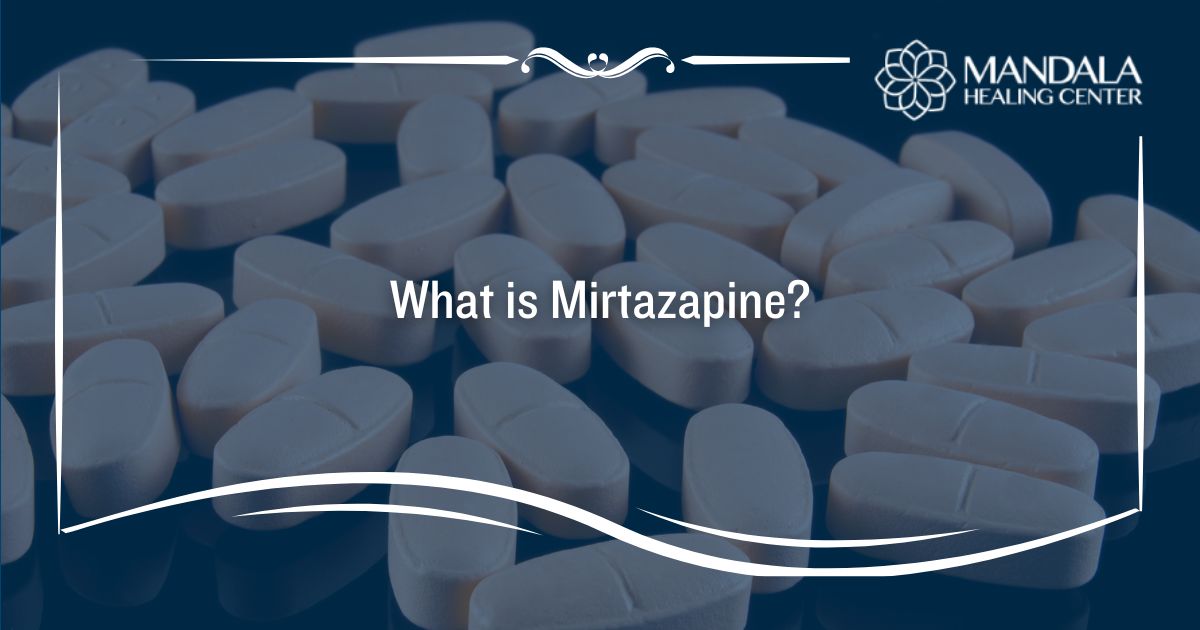Mirtazapine is an antidepressant sold under the brand name Remeron.[1] Doctors might prescribe it to treat depression, anxiety, insomnia, and suicidal thoughts. It comes as a circular pill that is beige, but you should avoid taking any medications if you are unsure what they are.
If you find mirtazapine in your loved one’s belongings, you find yourself asking if it is addictive. Because it belongs to the tetracyclic class of drugs, there is no risk of developing an addiction. However, if you take it long-term, suddenly stopping its use could lead to withdrawal symptoms.
Even though Remeron is not addictive, some people might attempt to abuse it. Remeron abuse is common among people with a history of substance abuse or individuals experiencing suicidal thoughts. Unfortunately, there are plenty of risks associated with mirtazapine abuse, including confusion, increased heart rate, memory problems, and life-threatening overdoses.
In this article, you will learn:
- What are the effects of Remeron?
- How can you identify mirtazapine?
- Is Remeron addictive?
- What are the risks of abusing mirtazapine?
What are the Side Effects of Mirtazapine?
Mirtazapine comes as an orally disintegrating tablet and circular pills. Your doctor or pharmacist will direct you to take them once daily at bedtime with or without food. While Remeron is effective in treating depression and related anxiety or insomnia, it can cause side effects.
The common side effects of mirtazapine include:[2]
- Dizziness and drowsiness
- Anxiety
- Confusion
- Increased appetite and weight gain
- Dry mouth
- Constipation
- Nausea and vomiting
If you experience nausea after taking mirtazapine, consider taking it with food. An empty stomach can worsen symptoms like nausea and vomiting. If you experience side effects lasting longer than two weeks or severe effects, talk to your doctor about whether it’s time to try a new medication.
It’s important to note that Remeron has drug interactions. You should avoid drinking alcohol and never mix it with monoamine oxidase inhibitors (MAOIs), as this could lead to serotonin syndrome.[3]
How to Identify Mirtazapine
Mirtazapine or Remeron comes in different shapes and colors depending on dosage:
- 7.5 mg is white and circular
- 15 mg is oblong-shaped and yellow
- 30 mg is oblong-shaped and has a brown/orange color
- 45 mg is oblong-shaped and white
If you find a pill in your purse or on the floor, never consume it without using a pill identifier. Even then, it is best to dispose of the medication and use one that comes directly from your prescription bottle. Some medications have a similar appearance to each other, making it difficult to determine exactly what pill you are looking at.
Is Mirtazapine Addictive?
Mirtazapine is not considered a narcotic or a habit-forming substance. In other words, you cannot get addicted to it. That is why doctors prescribe mirtazapine to treat depression, as it is effective in managing the condition and comes with little risk.
That being said, if you take Remeron daily, you will become dependent on it. This simply means you cannot stop taking it suddenly, as you could experience withdrawal. Instead, contact your doctor to decide whether you need to commit to a tapering schedule to get off of Remeron.
The withdrawal symptoms associated with mirtazapine include:[4]
- Anxiety
- Shaking or tremors
- Tingling sensations
- Nausea and vomiting
- Confusion and agitation
- Dizziness and drowsiness
- Disorientation
- Sweating
- Headaches
What are the Dangers of Abusing Mirtazapine?
While Remeron is not addictive, some people attempt to abuse it. The medication can make you feel sleepy and drowsy, which might be a feeling some individuals seek. Despite this, mirtazapine does not cause a high.
Even though Remeron does not get you high, abusing it can have consequences. You could experience the following adverse effects from misusing mirtazapine:
- Confusion
- Increased heart rate and anxiety
- Sleepiness and drowsiness
- Memory problems
If you take large doses of Remeron in an attempt to get high, you could experience an overdose. The symptoms of a mirtazapine overdose include:
- Tachycardia (abnormally fast heartbeat)
- Hypertension or increased blood pressure
- Central nervous system depression
Even though Remeron overdose is usually not life-threatening, you should still seek medical care if you experience severe symptoms. Medical professionals can provide you with IV fluids and medications to ensure you remain stable in the event of an overdose. If you took a large dose of mirtazapine in a suicide attempt, mental health treatment is vital for long-term recovery.
Get Help for Substance Abuse and Addiction
If you or a loved one abuses alcohol or drugs, you could be suffering from addiction. Substance use disorders can be incredibly difficult to overcome, especially on your own. In other words, you should always seek professional addiction treatment to overcome substance abuse issues.
At the Mandala Healing Center, we provide a combination of individualized and evidence-based treatment. At our rehab program, you will receive all of the tools and support you need to achieve long-term recovery from addiction.
Contact us today to learn more about how our drug and alcohol rehab program can help you recover.
References:
- The Food and Drug Administration (FDA): Remeron Label
- Medline Plus: Mirtazapine
- UptoDate: Serotonin Syndrome
- The Primary Care Companion: Mirtazapine-Associated Withdrawal Symptoms: A Case Report
















